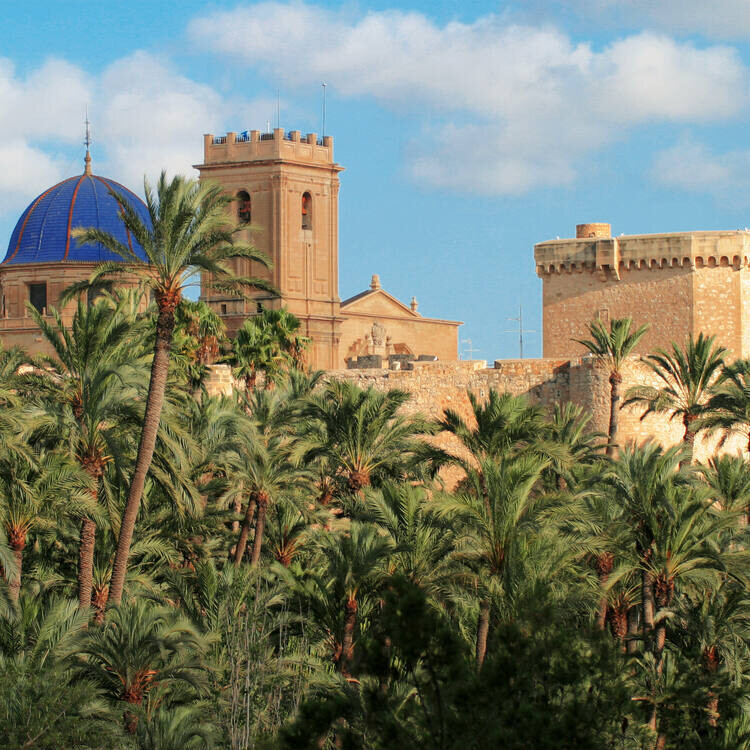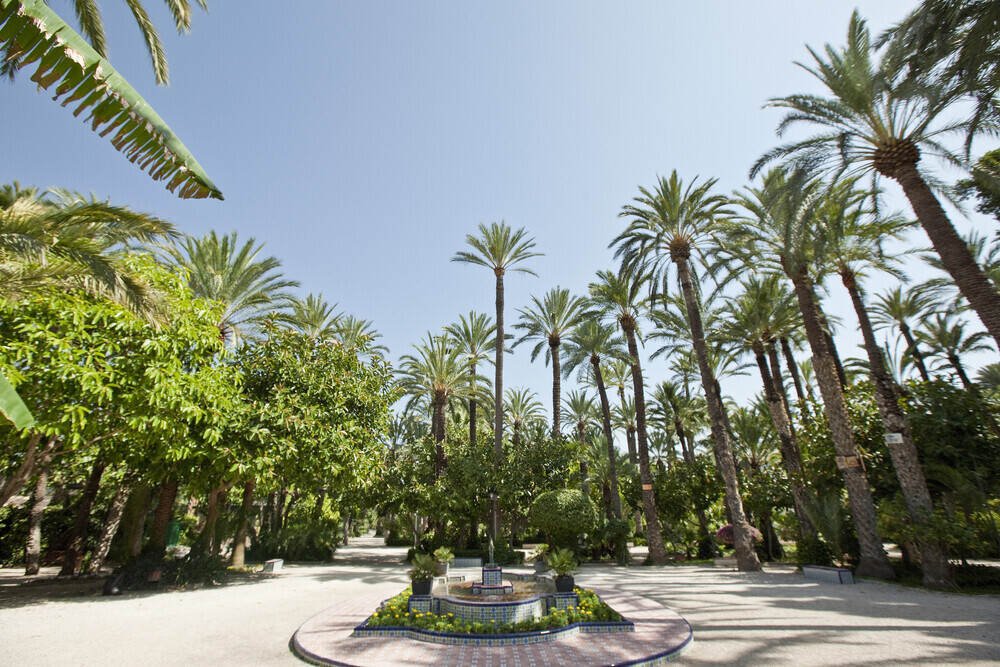Discover Alicante, its historical sites, delicious food and awarded beaches
- 4 minutes to read
- 21 June 2022
- lizabala
Discover Alicante, its historical sites, delicious food and awarded beaches
Are you planning your summer holidays at the beach? I would like to introduce you a beautiful city on the southeastern coast of my home country, Spain: Alicante.
The province of Alicante is located in the autonomous community of Valencia, in the southeast of Spain. It is well known for its stunning beaches as well as its culinary traditions and historical landmarks. Do you feel like visiting medieval castles overlooking the Mediterranean Sea or discovering the largest palm grove in Europe?
Sightseeing highlights in the province of Alicante

Palmeral of Elche in front of the Basílica menor de Santa María. (Source: Paco Cascales / © Visitelche, https://whc.unesco.org, CC BY-NC-ND 4.0)
Among numerous highlights in this region, here are two of my favorites. The first is the Palmeral of Elche, declared UNESCO World Heritage Site since 2000. It dates back to the end of the tenth century and is considered a great example of Arab agricultural practices in Europe. It has over 200,000 palm trees, making it the largest palm grove in Europe.
The Ruta del Palmeral is the main path through the grove and is completely accessible to wheelchair users. Even more, the city of Elche has been awarded for the accessibility of its buildings, services, and tourist attractions.
If you want to know more details about the history, culture and characteristics of this “Mediterranean oasis”, visit the Palm Grove Museum. It has several exhibition rooms with videos, touchscreens, and ambience sounds – an immersive experience!

Ruta del Palmeral in Elche. (Source: José Luis Municio / © Instituto del Patrimonio Cultural de España. Ministerio de Educación, Cultura y Deporte, https://whc.unesco.org)
The second highlight is the wheelchair-accessible castle of Santa Bárbara. It is located on top of Mount Benacantil in the middle of the city and offers outstanding panoramic views of the Alicante bay. The castle is also part of the legend of how the city of Alicante got its name.
To get to the top of the castle, there are two elevators on Postiguet beach. They are accessible going through a tunnel under the old city wall, a beautiful and easy adventure! The castle can also be accessed by car. Guided tours are available in English, with free entrance to the castle.

View from Santa Bárbara Castle over the city of Alicante. (Source: Ayuntamiento de Alicante/Ernesto Caparrós, https://www.alicanteturismo.com)
Mediterranean delicacies
While the whole Valencian region, where Alicante is located, is famous for its paella, I would like to share other popular dishes that characterize Alicante's cuisine. The locally-produced turrones are almond-based nougat confections, whose original recipe dates back five centuries! They are very popular during the Christmas time. The selection of high-quality raw ingredients and the way to mix the ingredients correctly are fundamental. If you have a sweet tooth, I can certainly recommend turrón in its different varieties!

Alicante turrón.
The hand-picked Cerezas de la Montaña de Alicante – cherries from the mountain of Alicante – are also worth mentioning. They are quite sweet and have a soft flesh.

Cerezas de la Montaña de Alicante. (Source: https://cerezasdealicante.com)
Last but not least, try Arroz a banda! It is a rice dish which is said to be an invention from fishermen. It is cooked in a fish broth with potatoes, onions and saffron. It is usually served with aioli, a typical Spanish sauce made with garlic, olive oil, eggs yolks and freshly-pressed lemon juice.

Arroz a banda. (Source: https://valenciasecreta.com)
World leader of Blue Flags
Now let's get to the beach(es)! To promote environmental issues and awareness, the Foundation for Environmental Education created the Blue Flag programme in 1987 to recognize sustainable beaches, marinas and boats. The province of Alicante has 74 beaches, including the well-known Postiguet beach, which have been awarded the Blue Flag recognition by the European Union. This makes it the coastline with the most blue-flagged beaches in the whole world! With 713 Blue Flags, 615 of those for beaches, Spain ranks first for the 34th consecutive year in the list of 48 countries which have been recognized by the programme.
Blue-flagged beaches need to meet and maintain 33 criteria regarding environmental education and information, water quality, environmental management, as well as safety and services. The last criterion no. 33 is about “access and facilities provided for the physically disabled”. It requests to provide disabled parking, access to the beach, to surrounding buildings, the restroom facilities, and, “if possible”, to the water.

Accessible gazebo on Postiguet beach. (Source: https://www.alicanteturismo.com)
Consider, however, that for the criterion to be fulfilled, only one beach per municipality needs to be accessible, for whatever reason… In other words, a Blue Flag does not necessarily mean that a beach is accessible; it means that in this municipality there is at least one accessible beach. This could be the chosen beach but also another blue-flagged beach nearby.
Therefore, it is recommended to check the characteristics of the beaches forehand: just go to this world map of all blue-flagged sites, click on the beach you are interested in, and then check the link next to “Full details” to get further information. Of course, this also works for beaches anywhere else in the world. 😉
You can find an overview of accessible beaches in Alicante here or use this search mask to get detailed information on every beach. From July 1st to September 15th, four beaches – San Juan, Postiguet, Saladares-Urbanova, and Tabarca Island – offer accessible areas with services to assist people with reduced mobility; this includes a service of accompaniment and assistance to the toilet as well as amphibious chairs and crutches free of charge.

San Juan beach in Alicante.
Have you ever been to Alicante? Which other places do you recommend to enjoy the Mediterranean Sea? Please share your experiences with us. Happy holidays!

